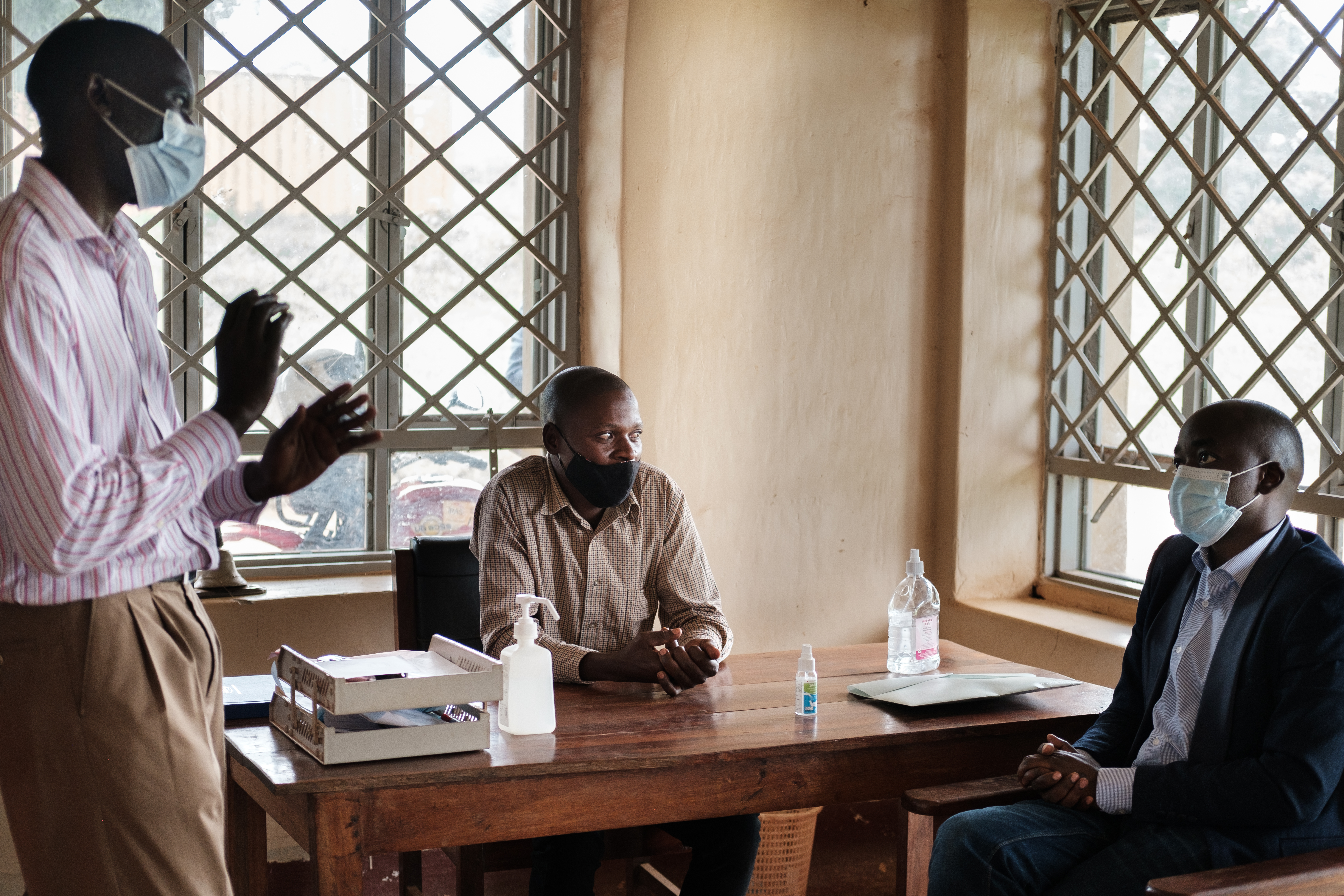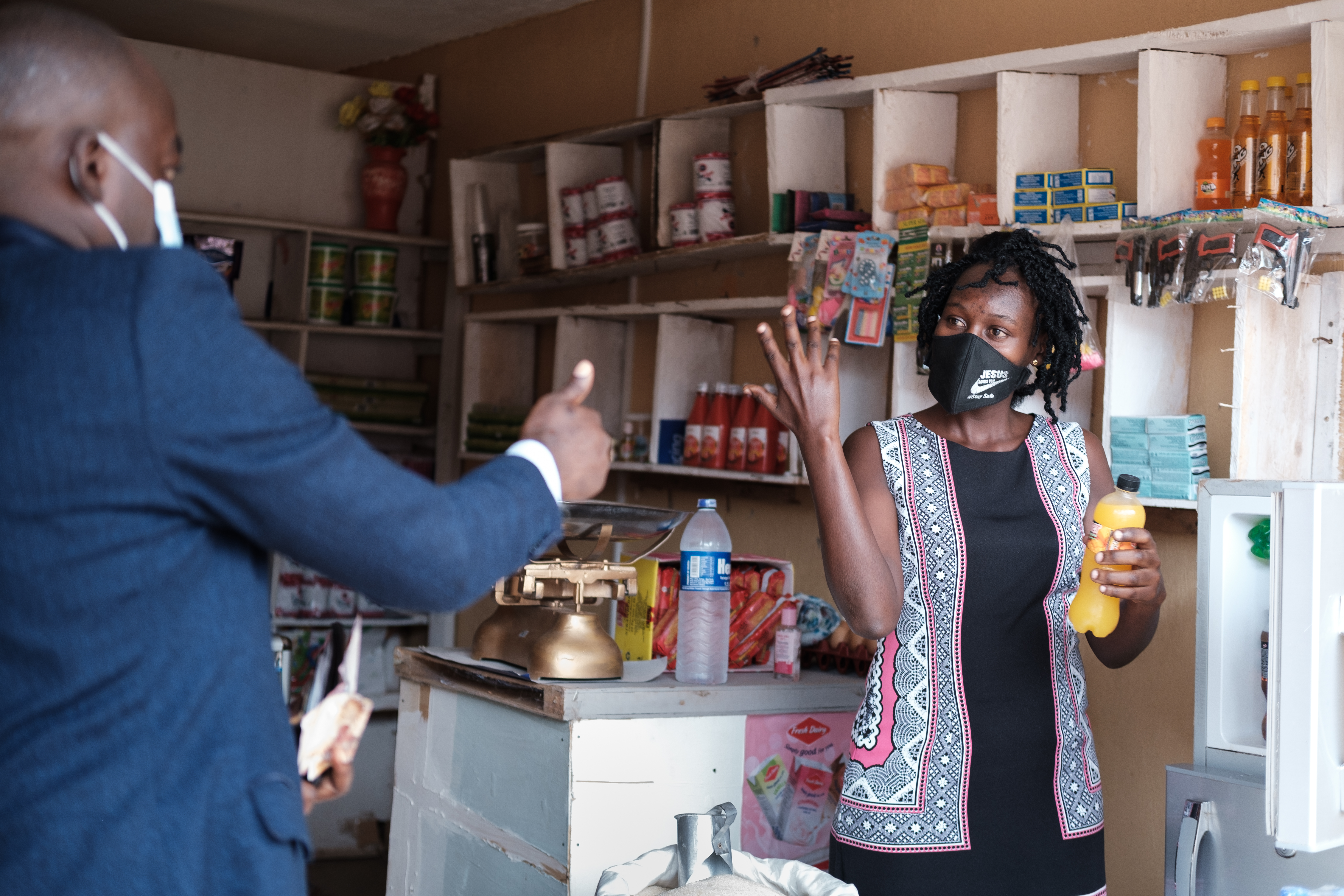The Road to Representation: A Conversation with Robert Ssewagudde
Just 25 kilometers from Kampala in Busukuma division, Robert Ssewagudde visits his home district for the first time since being sworn in as a local councilor for people with disabilities in his community. He is eager to begin the hard work of being an advocate for inclusion and ensuring that government funding for people with disabilities reaches those who need it most. His excitement to start is palpable as he shares his story.
Tell me about yourself
I am called Robert Ssewagudde and I am a 31 years old man with a hearing impairment. I come from a family where I am the only Deaf child. I have eight brothers and two sisters. I love watching and playing football and socializing with friends. I am an Arsenal fan. On a local level, I support the Deaf Stars football team, a team of only Deaf players that I founded and also play on.
I work as a Disability Inclusion Facilitator with Light for the World and a board member of NUDIPU (National Union of Persons with Disabilities Uganda) where I represent youth. I am also a board member of the Uganda National Association of the Deaf. I am currently the male Councilor for people with disabilities at the local council three (LC3) level in Busukuma division in Wakiso district.
What does a councilor do?
I will represent and give the views of people with disabilities to the local council, advocate for inclusion so their voices are heard, and ensure that the council incorporates programs that support the development of people with disabilities.
What did your family think of your campaign?
I became Deaf at seven years old because of Malaria. This had an impact on me and my parents. People in the community used to call me derogatory words and say that Deaf people are idiots, but my mother never gave up on me. Many people thought I would never leave home or have a family, but my mother did her best and took me to a mainstream school. During my swearing-in, my mother came and people were very surprised, she said “this is the small Deaf boy you used to see and make fun of”. Many of my relatives came to the swearing-in and were congratulating her, and now they respect her a lot in the community.

What inspired you to get involved in politics?
There are a lot of services that my area has not accessed. They have not benefited from government educational programs and they have lacked health centers for many years. I felt that the voices of people with disabilities were not being heard due to discrimination and negative attitudes. That’s why I decided to get involved in grassroots politics so that I can go in and demand these services as a councilor. I want to see a world where there is full and total inclusion of people with disabilities.
How did your experience as a Disability Inclusion Facilitator prepare you for this campaign and your position as councilor?
Being a Disability Inclusion Facilitator has been vital in building my capacity. It helped to build my self-esteem to really put inclusion into action. My decision to run for the LC3 position came from the empowerment I received as a Disability Inclusion Facilitator. I have had experiences with organizations and companies, but we have never had a disability inclusion facilitator participating as a part of the government.
I would like to give all of the councilors in my district Disability Awareness Training to ensure that we have the inclusion of people with disabilities in all council activities, but they can only do that when they have the knowledge. Light for the World has empowered me to know how to give training and conduct disability inclusion assessments. I want to take the council through the inclusion process step by step. I want to do an accessibility audit at the division level because the government has the funds to make changes.
Tell me about the campaign, what strategies did you use to get elected?
The campaigns were very tough. My strategy was to be very friendly to people and give them a listening ear to hear their challenges. I used the skills I gained as a Disability Inclusion Facilitator to engage the people. Getting to know people helped me to win the council vote. My campaign was during the era of COVID-19 and the first lockdown so I couldn’t really travel and meet people. I concentrated on sending messages to every potential voter. Since I grew up in the area, I also had many friends who helped me and became my voters. In the national election, I had two competitors and I won with 86% of the vote.

What inclusive communications strategies did you use in the campaign?
First, I used social media, secondly, I used facial expressions when I could meet with people face to face, and I used a sign language interpreter. I also had support from local councilors to use local sign language without an interpreter.
What is one story you can tell us about the campaign that really stuck with you?
I met one gentleman during my campaign who has a child with a disability. He told me that he was keeping this child at home because he was afraid of the community finding out. He didn’t know what he was supposed to do. He never had information about what the government was doing and he never had confidence. That really touched me, and I felt very emotional about it. I told him that after the campaigns, I would find a way for his child to go to school. Before meeting me the man was very negative about people with disabilities, and about his own child. I told him “look at me, I am a Deaf person, ” which really changed his view. He was able to go home and tell the neighbors about his child’s impairment. The gentleman came to my swearing-in and thanked me for building his confidence. He told me that he is now an ambassador for people with disabilities in his village.
What did the Deaf community think about your campaign?
The Deaf community was very happy. When I won, many people sent me messages of congratulations and said that they are with me. I am the first Deaf person to represent Deaf people in the council at this level, and I hope I represent them well.
People with hearing impairments have not fully participated in local government meetings because there is no interpreter, but now because I have been elected my goal is that there will be an interpreter and Deaf people will be able to participate. In another five years, we will have an election, and I hope there will be more Deaf people applying for my post.
What was the perception of the community without disabilities of your campaign?
People were unsure if a Deaf person would be able to articulate their views in the council, but I used my skill and also I used a professional interpreter so I was able to express myself using my sign language. The media was there to cover us, and they started to trust us and forgot about the negativity they had about deafness. I told people, don’t look at my disability, look at my potential, and I will bring services to you.

What would you tell young people with disabilities about the importance of taking on leadership roles in their communities?
Let us not underestimate ourselves and lose self-esteem. Let’s believe in ourselves and take on leadership roles. I like the quote from former US president Barack Obama “Yes we can!” When we take on leadership roles and are good examples, people will forget about our weaknesses. This is not the time for asking for charity, this is the time for asking for equality, equity, and representation. Let us show our capabilities.

